Corpus Christi Year A
Sunday June 7, 2026
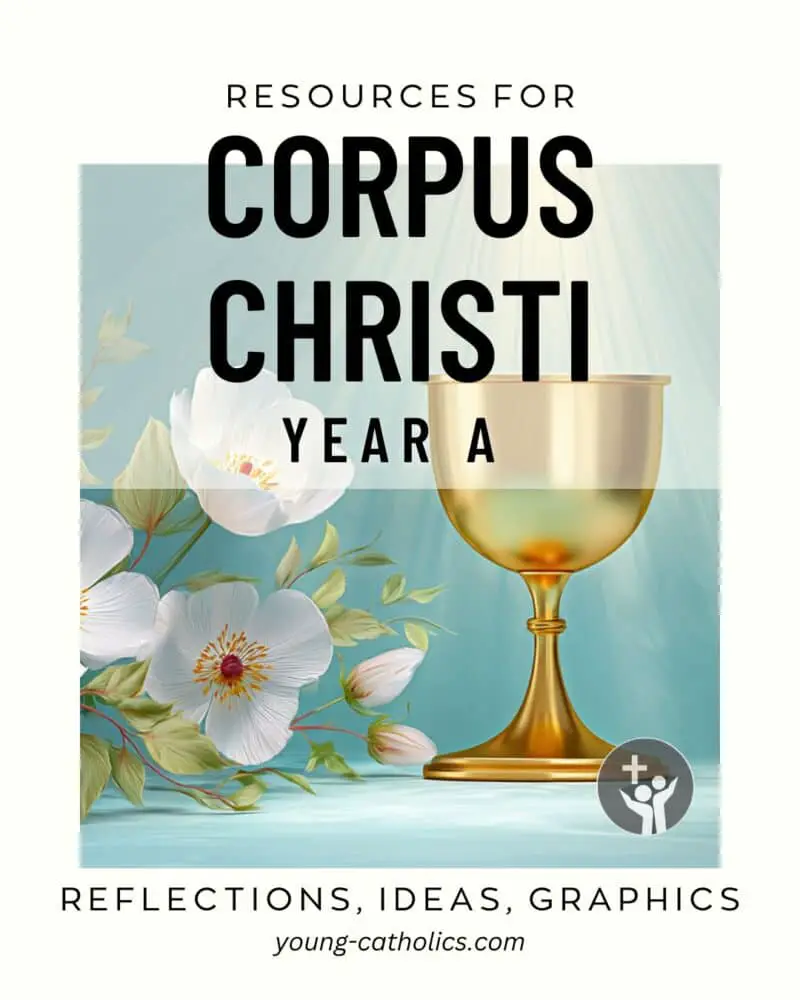
The Gift of Living Bread
Corpus Christi Year A is a feast that helps us remember the gift of the Eucharist. It is a day to focus on Jesus as the bread of life. The readings remind us that God provides what we need, not only for our bodies but also for our souls.
This celebration points us back to the desert, where God gave manna to His people. It shows us that we depend on Him for life itself. The Eucharist is the new manna, given through Jesus, who offers Himself so that we may live forever with Him.
Corpus Christi Year A also reminds us that we are one body in Christ. When we share the bread and cup, we are united as His people. It is a gift that nourishes us, strengthens us, and draws us closer to God and to one another.
Mass Readings for Corpus Christi Year A
- First Reading – Deuteronomy 8:2-3, 14B-16A: God led and tested the Israelites in the desert, providing manna and water, to show that life depends on His word.
- Responsorial Psalm – Psalm 147: Praise the Lord for strengthening Jerusalem, granting peace, and sharing his word and laws with Israel.
- Second Reading – 1 Corinthians 10:16-17: The cup and bread we bless signify our sharing in Christ’s blood and body, uniting us as one body.
- Gospel – John 6:51-58: Jesus declares He is the living bread from heaven. To have eternal life, we must eat His flesh and drink His blood, ensuring our union with Him and eternal life.
The readings above are for lectionary cycle A. For other years see the links below:
Corpus Christi Year B
Corpus Christi Year C
Amen, amen, I say to you, unless you eat the flesh of the Son of Man and drink his blood, you do not have life within you.
John 6:53
Themes for Corpus Christi Year A
Corpus Christi Year A invites us to think about what it means to receive Jesus in the Eucharist. The readings help us see how God feeds His people and draws them together as one.
- Living Bread from Heaven: Jesus calls Himself the living bread. This reminds us that the Eucharist is not just a symbol, but real food for our souls.
- God Provides in Hard Times: In the desert, God gave manna and water to His people. This shows He cares for us even when things are hard.
- Unity Through the Eucharist: Sharing one bread brings us together. The Eucharist makes us one Church, one body in Christ.
- True Life in Christ: Jesus says we must eat His flesh and drink His blood to have life. The Eucharist connects us to eternal life.
- Trusting God’s Word: God told His people they live by His word, not just by bread. We are reminded to listen and trust Him, especially when we are unsure.
- Sacrifice and Gift: The cup we bless reminds us of Christ’s sacrifice. In every Mass, we remember His love and offer ourselves back to Him.
- Memory of Salvation: God told His people to remember what He did for them. The Eucharist helps us remember Jesus and what He has done to save us.
Corpus Christi Year A calls us to treasure the gift of the Eucharist. It reminds us that Jesus is with us in every Mass, feeding us and making us one.
Resources for Corpus Christi Year A
Sunday June 7, 2026
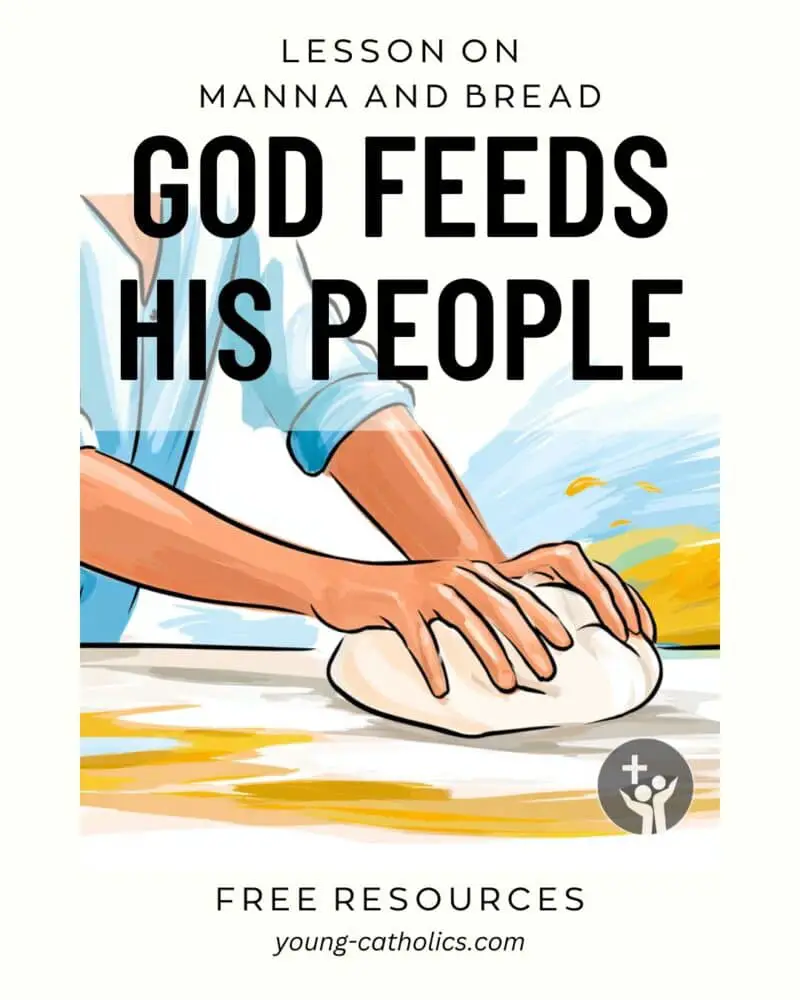
God Feeds His People – A Lesson Plan on Manna and Bread
This lesson plan helps youth understand how God has cared for His people through the gift of food. It uses simple Bible stories to show that God feeds both body and soul and wants to be close to us.
By looking at manna, miracles, and the Eucharist, young people can grow in their love for Jesus. It fits well with the message of Corpus Christi Year A, which reminds us that Jesus still feeds us today in the Eucharist.
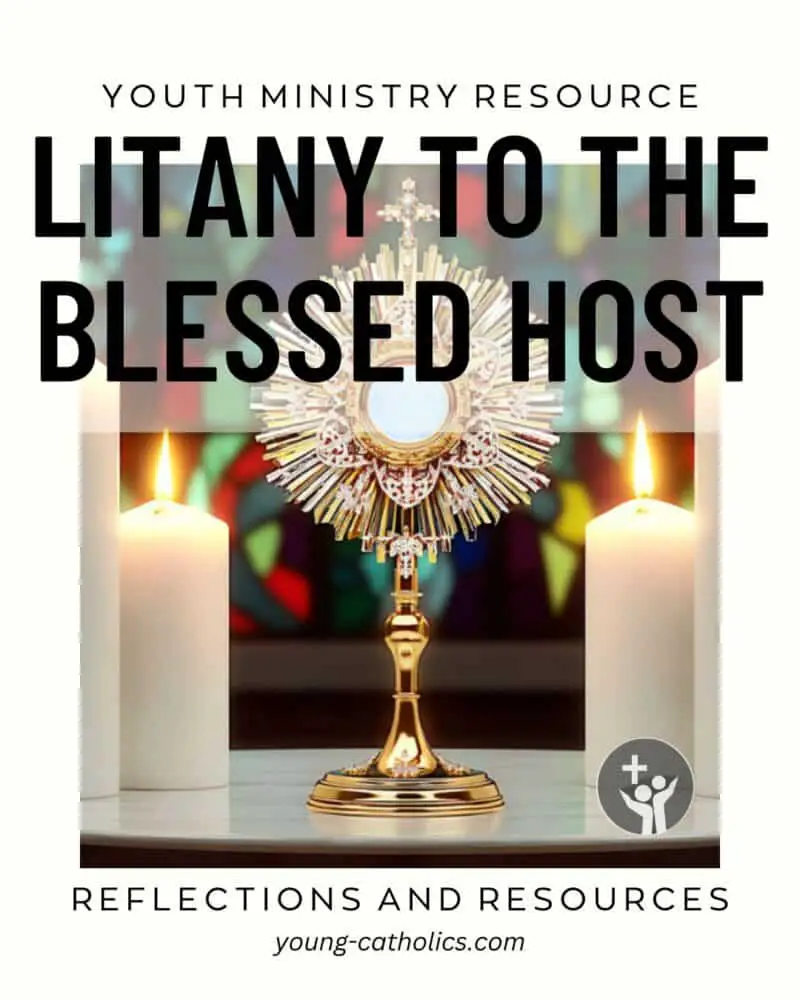
Litany to the Blessed Host
This simple and poetic litany invites us to sit quietly with Jesus in the Eucharist. Saint Faustina wrote it from a place of deep faith and longing for God’s presence.
It is especially meaningful during Corpus Christi Year A, which reminds us that Jesus is truly with us in the Blessed Sacrament. The litany can help young people grow closer to Him through prayer.
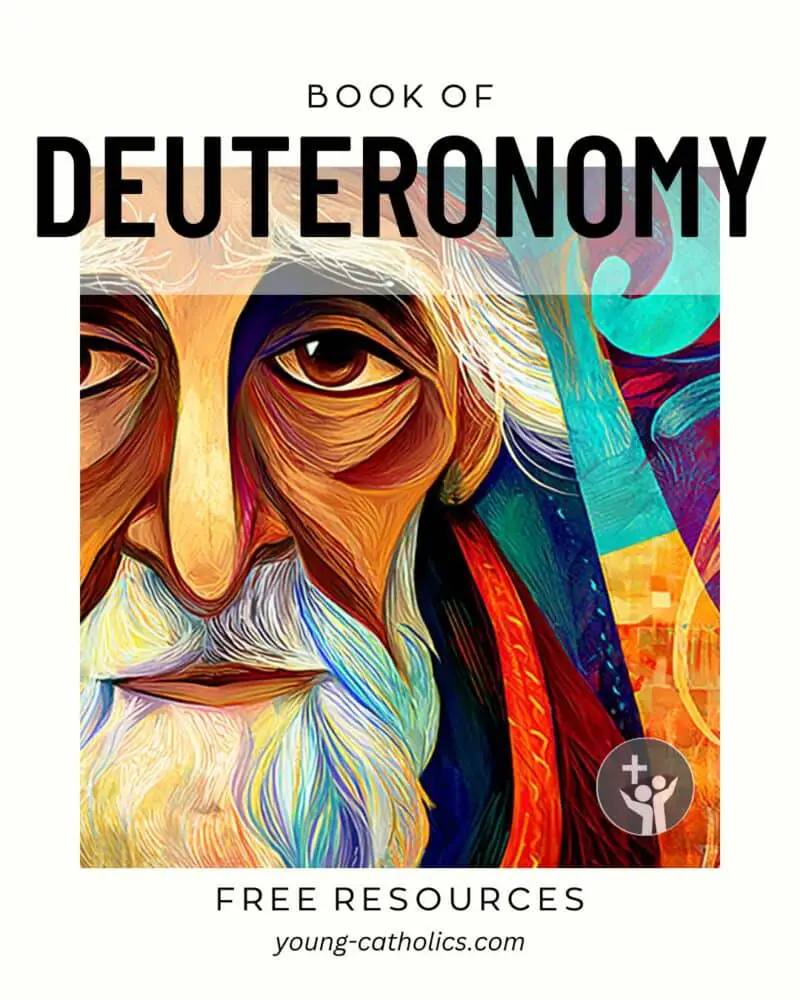
The Book of Deuteronomy : God Feeds and Tests His People
Deuteronomy 8:2-3, 14B-16A reminds us how God cared for the Israelites in the desert. He fed them with manna and gave them water from a rock. This was not just to meet their physical needs but to teach them to depend on Him. The lesson was clear: trust God’s word more than daily bread.
The book of Deuteronomy is a call to remember and obey. Moses speaks to the people before they enter the Promised Land. He tells them to stay faithful to the covenant and not forget what God has done. In Corpus Christi Year A, this reading helps us see how God still feeds His people—now through the Eucharist.

Psalm 147: God’s Word and Blessing for His People
Psalm 147 praises God for His care and protection. He builds up Jerusalem, brings peace, and gives His people His word. This Psalm shows that God’s blessings are not just material. His greatest gift is His presence and guidance.
The Book of Psalms teaches us how to pray and praise. It is full of songs that reflect trust in God’s care and justice. Psalm 147 connects to Corpus Christi Year A by lifting our hearts in thanks. God who gave His word to Israel now gives Himself in the Eucharist.
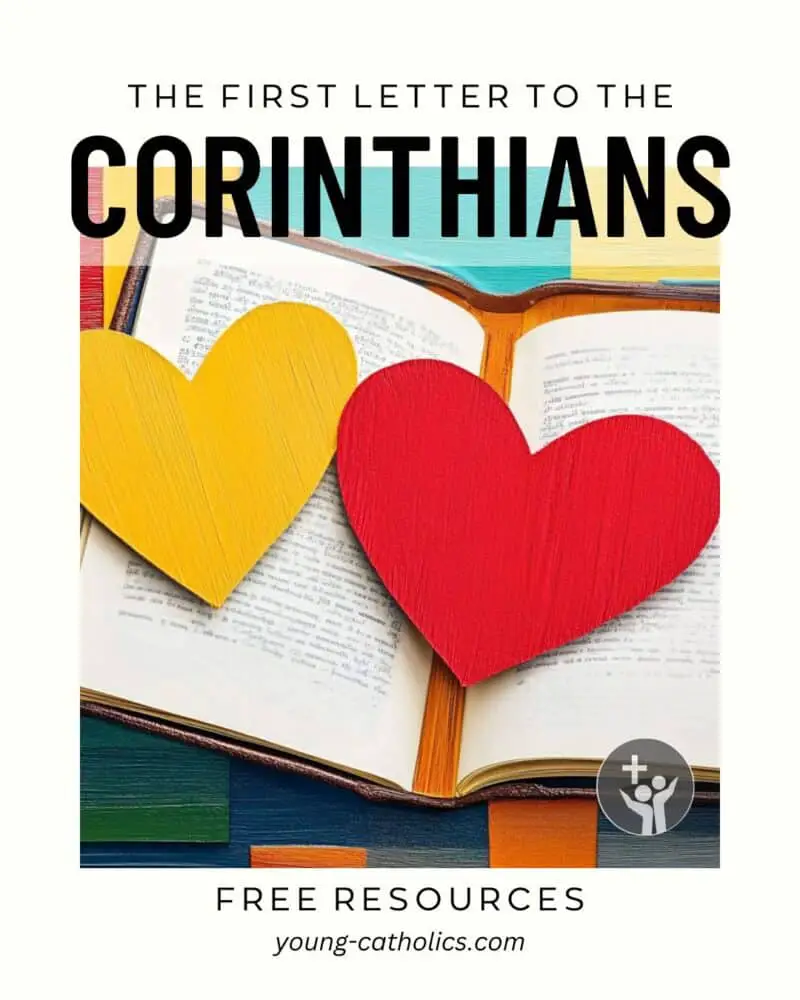
1 Corinthians: One Bread, One Body
1 Corinthians 10:16-17 teaches that the Eucharist is more than a meal. Sharing in the cup and bread means sharing in Christ. It brings unity. We are joined to Christ and to each other through this act of faith.
In the larger letter, Paul addresses problems in the Corinthian church. There were divisions, pride, and confusion. Paul reminds them that the Eucharist calls for unity and love. In Corpus Christi Year A, this reading reminds us that receiving Christ means living as one body.
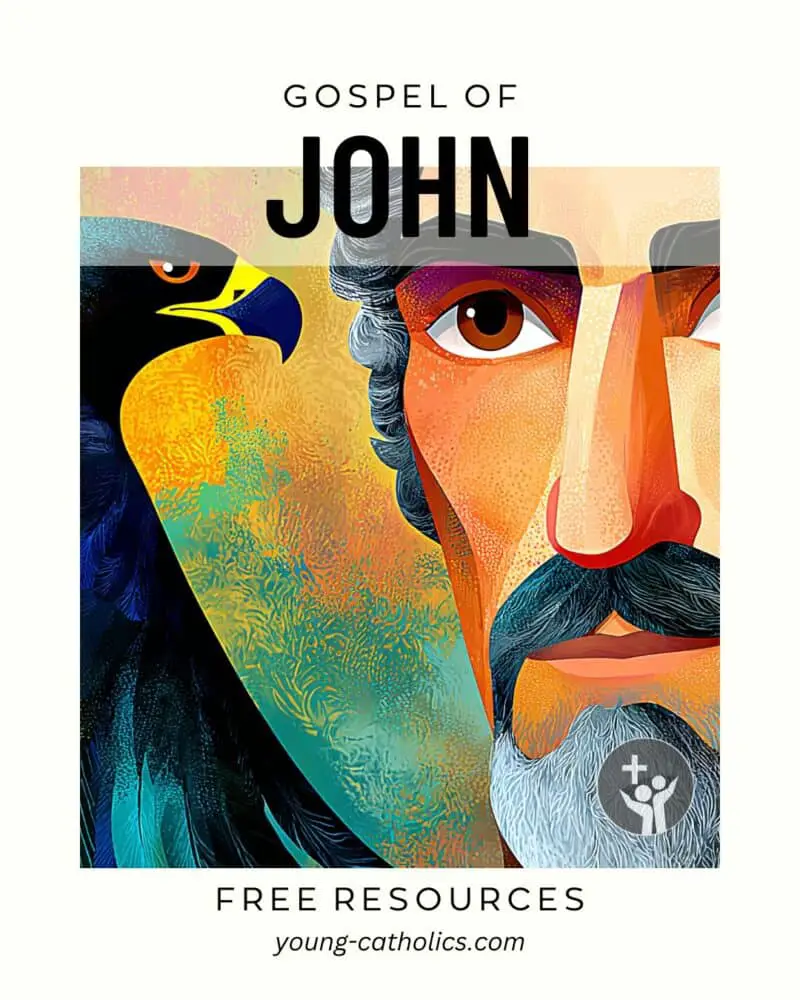
The Gospel of John: The Bread of Eternal Life
John 6:51-58 is part of Jesus’ teaching about the Bread of Life. He says clearly that His flesh is real food and His blood is real drink. This is how we remain in Him and receive eternal life. The Eucharist is His way of staying with us.
The Gospel of John focuses on who Jesus is. It highlights His identity as the Son of God and the source of life. The Bread of Life discourse in John 6 is key to that message. In Corpus Christi Year A, this reading invites us to believe deeply that Jesus is present in the Eucharist.
Homilies and Commentaries for Corpus Christi Year A
Sunday June 7, 2026
Soul and Divinity
In this commentary, Jeff Cavins explains how the Eucharist is truly the Body and Blood of Jesus, not just a symbol. He traces the story from the Garden of Eden, where Adam and Eve were blocked from the tree of life, to the cross, where Jesus gives us His body as the new fruit of life.
He highlights how the manna in the desert and Jesus’ teaching in John 6 show that God feeds His people in a deeper way now. Jeff reminds us that, unlike other groups, Catholics believe in transubstantiation. In Corpus Christi Year A, we are invited to remember this gift and come together as one through the Eucharist.
How the Eucharist Changed My Life
This reflection explains why the Eucharist is so important for Catholics. It is not just a symbol, but truly the Body and Blood of Jesus Christ.
Fr. Mike Schmitz shares how this truth changed his life. He walks through John 6, where Jesus clearly says we must eat His flesh and drink His blood. Fr. Mike reminds us that Jesus gave Himself to be close to us, to feed us, and to never leave us alone.
Bread in the Desert
Corpus Christi Year A reminds us that the Eucharist is the living bread we need to survive the journey from sin to salvation. Bishop Barron compares this to the Israelites’ journey from Egypt to the Promised Land. Just like they needed manna in the desert, we need the Body and Blood of Christ to stay strong in faith and move toward eternal life.
Bishop Barron explains that sin acts like an addiction, keeping us trapped. The way forward is hard and slow, like the desert path. But God feeds us along the way. In the Eucharist, Jesus gives himself as real food and drink. We don’t just follow him—we are united with him. Without this gift, we cannot grow in grace. That’s why the Church calls the Eucharist the source and summit of the Christian life. It’s not optional—it’s what gives us life.
Word of the ‘Living Father’
Scott Hahn explains that the Eucharist is both a challenge and a promise from Jesus. In the Gospel, many people struggle to accept His teaching about eating His flesh and drinking His blood. Jesus uses strong words to make it clear that He means what He says.
This teaching shows us that the Eucharist is more than food. It is a way to share in Jesus’ life and be united with Him. Scott Hahn reminds us that, through the Eucharist, we are promised eternal life. In Corpus Christi Year A, we are invited to trust in this gift and believe in the mystery.
Super Substantial Bread
Corpus Christi Year A reminds us that the Eucharist is not just a symbol—it is the real presence of Jesus, given to us as food for our spiritual journey. Bishop Barron points to the troubling fact that many Catholics no longer believe this, even though Jesus clearly said, “My flesh is true food, and my blood is true drink.” Just like the Israelites in the desert needed manna, we need the Eucharist to make it through life’s trials.
Bishop Barron explains that this journey mirrors our path from sin to eternal life. The Eucharist is our strength in the in-between time. He also connects the line “Give us this day our daily bread” to the Greek word meaning “super substantial bread,” which points to the transformed nature of the Eucharist. Without this sacred food, we grow weak and risk turning back to sin. The Eucharist gives us what we need to keep moving toward heaven.
Reflection for Corpus Christi Year A
Corpus Christi Year A is a time to reflect on the gift of the Eucharist. The readings remind us that God provides for His people, unites us through the Body and Blood of Christ, and calls us to trust in Him. The Eucharist is not just a ritual; it is Jesus Himself, given to bring life and unity.
Humility and Gratitude for God’s Blessings
The first reading for Corpus Christi Year A reminds us that everything we have comes from God. The Israelites wandered in the desert, and God provided for them. He gave them food, water, and guidance. They had to trust Him, knowing that He would take care of them.
This reading also warns against pride and forgetfulness. When people are comfortable, they might think they achieved success on their own. They forget that God is the one who gave them their talents, opportunities, and resources. Corpus Christi Year A calls us to remember that all blessings come from God.
Being grateful helps us stay humble. It reminds us that we depend on God every day. We should thank Him not only for big things but also for small blessings. The Eucharist itself is a reminder that Jesus gives us everything we need.
One way to grow in gratitude is through prayer. Taking time each day to thank God changes our attitude. It helps us see our blessings more clearly. Corpus Christi Year A invites us to trust in God’s care and to remain thankful for His gifts.
The Eucharist Brings Unity
The second reading for Corpus Christi Year A teaches that the Eucharist unites all believers. Paul explains that sharing in the Body and Blood of Christ makes us one body. The Eucharist is not just a personal experience. It connects us to the whole Church.
This is important because people often feel alone or disconnected. The world encourages independence, but faith is about community. Through the Eucharist, believers are joined together in Christ. Corpus Christi Year A reminds us that we are part of something greater than ourselves.
When we receive the Eucharist, we are not just remembering Jesus. We are taking part in His sacrifice and being strengthened by it. This helps us grow in love for one another. The Eucharist calls us to support and care for those around us.
Even when people cannot gather in person, the Eucharist remains a sign of unity. It reminds us that faith is not just about individual prayer but about being part of God’s family. Corpus Christi Year A encourages us to live in unity and love, strengthened by the Body and Blood of Christ.
Jesus Is Truly Present in the Eucharist
The Gospel reading for Corpus Christi Year A is one of the most important teachings about the Eucharist. Jesus says that He is the living bread from heaven. He tells His followers that they must eat His flesh and drink His blood to have life.
This teaching was hard for many people to accept. Some turned away because they did not understand. But Jesus did not change His words. He wanted people to know that the Eucharist is not just a symbol. It is His real presence, given to bring life.
The Eucharist is a great mystery. It cannot be fully explained, but it can be believed. Catholics trust that Jesus meant what He said. When they receive the Eucharist, they receive Jesus Himself. Corpus Christi Year A reminds us to approach the Eucharist with faith and reverence.
This calls for preparation. Receiving Jesus in the Eucharist should never be taken lightly. Prayer, reflection, and even confession help us receive Him with the right attitude. Corpus Christi Year A invites all believers to recognize the great gift of the Eucharist and to receive it with devotion.
The Eucharist is central to the Catholic faith. It strengthens believers, brings them together, and reminds them of God’s love. Corpus Christi Year A invites all to reflect on the meaning of the Eucharist and how it shapes their faith. It is a time to renew gratitude, deepen trust in Jesus, and approach the Eucharist with reverence.
Prayer
Lord, thank You for the gift of the Eucharist. Help us to trust in You, to be grateful for all You give, and to receive Your Body and Blood with faith. Unite us as one family in Christ. Strengthen us to love and serve others as You have taught. Amen.
Reflection Questions for Corpus Christi Year A
- How does the first reading for Corpus Christi Year A remind you to trust in God?
- Why is humility important in recognizing God’s blessings?
- How can you practice gratitude in your daily life?
- What does the Eucharist mean to you personally?
- How does the Eucharist unite believers as one body in Christ?
- Why do you think Jesus emphasized that His Body and Blood bring eternal life?
- How do you prepare yourself spiritually before receiving the Eucharist?
- What role does the Eucharist play in your relationship with God?
- How can receiving the Eucharist help you grow in love for others?
- What is one way you can deepen your understanding of the Eucharist?
Social Media Graphics and Bulletin Artwork for Corpus Christi Year A
If you would like an image to be made available as a specific product (card, poster, mug, etc.) or as an extra high resolution image for personal use just post a comment about what you want and we will create a link to our online store for you.
Radiance of the Living Cup

Bring beauty and meaning to your parish bulletins and newsletters with this Corpus Christi Year A image. The golden chalice, lit with heavenly light, reminds us of the gift of the Eucharist. Flowers symbolize life and joy in Christ.
This artwork is available for download and can help your community focus on the mystery we celebrate in the Body and Blood of the Lord.
Paid subscribers may download a large copy this digital artwork without watermarks, suitable for use in bulletins, social media, newsletters, etc., free of charge by clicking here. You must be logged in as a paid subscriber to access the file.
Only current paid subscribers have the rights to use the artwork.
Music Suggestions for Corpus Christi Year A
Sunday June 7, 2026
The music selections for Corpus Christi Year A reflect key themes from the readings. Many songs focus on Jesus as the Bread of Life, reminding us that He gives Himself to nourish our souls. Others emphasize the unity of believers through the Eucharist, showing how we are joined together as one body in Christ. Some selections express gratitude for God’s gifts, calling us to approach the Eucharist with humility and thanks. Others highlight the mystery of Christ’s presence in the Eucharist, inviting worshippers to reflect on His great love. Together, these songs help deepen faith and draw people into the meaning of Corpus Christi Year A.
- Behold the Lamb of God by Matt Maher
- Bread for the World by Bernadette Farrell
- Bread of Angels by Curtis Stephan
- Corpus Christi Sequence by James Poppleton
- Do This in Memory of Me by Chris Muglia
- Gathered in Your Name by Mikey Needleman
- Gift of Finest Wheat by John Michael Talbot
- King of My Heart by Greg Walton
- Here at This Table by Janèt Sullivan Whitaker
- I Am the Bread of Life by Steve Angrisano & Tom Booth
- Make Us Your Own by Ed Bolduc
- Miracle of Grace by Curtis Stephan
- No Greater Love by Tim Schoenbachler
- O Salutaris Hostia / O Saving Lamb by Tom Booth
- One Bread, One Body by John Foley
- One Bread, One Cup by Bobby Fisher, Ken Canedo, Greg Lee & Craig Aven
- Overflow by Matt Maher
- Remembrance by Matt Maher & Matt Redman
- Table of Plenty by Dan Schutte
- Taste and See by Steve Angrisano
- The Body of Christ by Sarah Hart
Music directors and musicians can use these selections to enrich worship and encourage deeper reflection on the Eucharist. These songs can help congregations engage with the themes of Corpus Christi Year A in a meaningful way. If you have other music recommendations, share them in the comments!
Questions and Answers for Corpus Christi Year A
What does the first reading for Corpus Christi Year A teach about trusting God?
It shows that God takes care of His people. The Israelites were in the desert, but God fed them and led them. This reminds us to trust that God will guide and provide for us in every situation.
Why did God give the Israelites manna in the desert?
God wanted to show them that He was their source of life. He gave them food so they would not go hungry, but He also wanted them to rely on His word. This teaches us that we need more than material things—we need God’s guidance and truth.
How does the second reading for Corpus Christi Year A explain the meaning of the Eucharist?
It explains that sharing the Eucharist unites all believers as one body. When we receive the Body and Blood of Christ, we are connected to Him and to each other. This reminds us that faith is not just personal but also about community.
Why is the Eucharist important in Catholic life?
The Eucharist is more than a symbol; it is Jesus Himself. When we receive it, we are spiritually nourished and strengthened. It helps us grow in faith and love for others.
What does Jesus mean when He says He is the living bread?
Jesus is telling us that He gives true life. Just as food keeps the body alive, the Eucharist gives life to the soul. Receiving Him in the Eucharist brings us closer to Him and leads to eternal life.
How does the Gospel for Corpus Christi Year A help us understand the Eucharist?
Jesus makes it clear that His Body and Blood are real food and drink for our souls. He calls us to receive Him in the Eucharist so we can share in His life. This reading teaches that the Eucharist is a great gift that connects us to Jesus.
Why do Catholics believe Jesus is really present in the Eucharist?
Jesus said that His Body and Blood are true food and drink. The Church has always taught that the bread and wine become His real presence. This is a mystery of faith that Catholics believe and celebrate.
How can we prepare to receive the Eucharist?
We can prepare by praying, confessing our sins, and reflecting on what the Eucharist means. We should receive it with reverence and a heart open to Jesus. This helps us grow in faith and love.
How does the Eucharist bring unity?
The Eucharist unites all believers as one family in Christ. When we share in the Body and Blood of Jesus, we are connected to Him and to each other. It reminds us to love, forgive, and support one another.
What does Corpus Christi Year A teach about gratitude?
It teaches that all we have comes from God. The readings remind us to be thankful for His blessings, especially the gift of the Eucharist. Gratitude helps us stay humble and trust in Him.
How can we live out the message of Corpus Christi Year A in daily life?
We can show gratitude by praying and thanking God each day. We can strengthen our faith by receiving the Eucharist with devotion. We can also live in unity by loving and serving others.
Jesus Gives Us His Body
Corpus Christi Year A celebrates the gift of the Eucharist. The readings show how God provides for His people, from manna in the desert to the Body and Blood of Christ. Jesus calls Himself the living bread and invites all to receive Him.
The Eucharist is more than a symbol. It is Jesus Himself, given to bring life and unity. Paul reminds believers that sharing the one bread makes them one body in Christ. This meal is not just for individuals but for the whole Church.
Corpus Christi Year A reminds Catholics to trust in Jesus and receive Him in the Eucharist. The Body and Blood of Christ give spiritual strength and the promise of eternal life. This feast calls all to reflect on the meaning of the Eucharist and its place in their lives.
Your Turn
The readings for Corpus Christi Year A show the importance of the Eucharist. God has always fed His people, and Jesus continues this through His Body and Blood. The Eucharist is a gift that brings life, unity, and faith.
Take time to think about these readings and what the Eucharist means to you. Share your thoughts and experiences in the comment section.

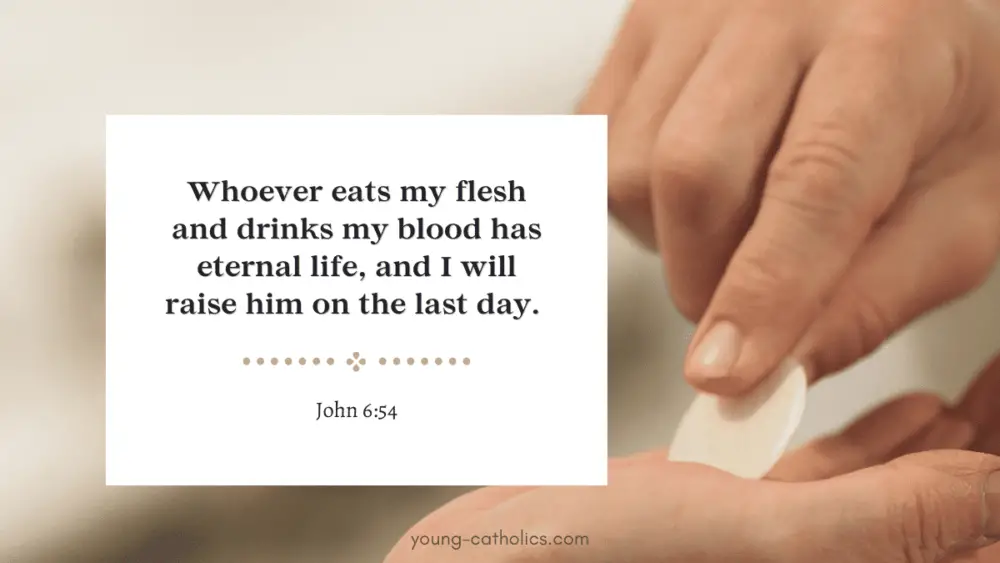
Leave a Reply